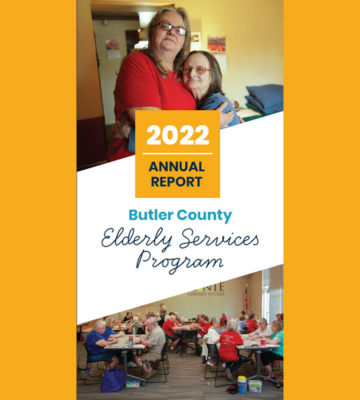Butler County Elderly Services Program 2022 Annual Report
Below are the full success and client stories from the Butler County Elderly Services Program (ESP) 2022 Annual Report. These stories illustrate the impact ESP has on older adults and caregivers in Butler County.
Click here to view the program’s 2022 annual report. To request a paper copy, email us.

Evaluation of ESP focuses on meeting the growing need for in-home care services
In a recent independent evaluation conducted by experts at Miami University’s Scripp’s Gerontology Center, Butler County’s Elderly Services Program (ESP) was found to be one of the top programs available in the state of Ohio. Scripps has a national reputation as a leader in gerontological studies and research and is located at Miami’s Oxford campus.
“The presence of Butler County ESP is a critical resource for the citizens of Butler County to respond to the demographic and social challenges of tomorrow,” the evaluation’s authors said.
The evaluation was commissioned and paid for by Council on Aging (COA), the state-designated Area Agency on Aging serving Butler County. COA is also the administrator of ESP in Butler County, via a contract with county commissioners, most recently renewed in Sept. 2022.
“The Elderly Services Program serves more than 4,000 individuals annually,” said Ken Wilson, COA’s vice president of program operations. “As such, it’s important that we continually evaluate the program to ensure we’re providing the highest quality services at the lowest possible cost using the tax dollars available to us.”
The evaluation relied on both quantitative and qualitative data, with quantitative data coming largely from census-related sources and qualitative data coming from interviews and focus groups with key stakeholders.
The goal of the evaluation was two-fold:
- identify opportunities to lower program costs, while continuing to provide high-quality services
- identify program changes that should be considered as the county prepares for the demographic growth that will occur over the next 20 years
Approximately 21 percent of Butler County residents are age 60 or older. In the county, overall population growth lags far behind the rate of growth in the older adult population, and demand for services provided by ESP will grow as the population ages. This increased demand is occurring alongside a severe shortage of homecare workers, leading to service disruptions for the families and individuals who rely on the program.
While the evaluation pointed to the program’s effectiveness at helping vulnerable Butler County older adults remain independent in their homes and communities, it also called attention to several areas where changes could better serve those in need and better position the program to serve more people in the future. These included:
- program eligibility based on age and functional needs
- efficient delivery of care management services
- innovation to address service delivery challenges created by the ongoing workforce shortage
- addressing the growing problem of social isolation
Scripps presented its findings to COA in February 2022. Since that time, a multidisciplinary group of representatives from COA, LifeSpan-Community First Solutions (ESP’s care management organization), ESP’s community advisory council, and the service provider network, have been meeting to review the recommendations and identify and implement changes to improve service delivery and sustainability in the program.
One of the evaluation’s chief recommendations, based on stakeholder feedback, was to revise the program’s eligibility criteria. This included a recommendation to lower the starting eligibility age from 65 to 60, while also reviewing overall program and service eligibility to ensure the program serves those most in need of support from a functional or disability perspective.
Many stakeholders interviewed during the evaluation process referenced a group of individuals who were perceived as “falling through the cracks.” This group included individuals age 60-65 who need assistance due to physical disability or cognitive impairment, but who do not qualify for ESP services because of their age.
Effective Jan. 1, the age of eligibility dropped from 65 to 60. This important change allows the program to serve younger older adults who have functional or cognitive needs which make them eligible for the program but who were previously excluded based solely on age.
The evaluation also highlighted growing gaps in services driven largely by the shrinking homecare workforce. Because there are not enough homecare workers to fill the demand for services, many older adults enrolled in ESP experience delays in starting certain services, inconsistencies in the delivery of their services, and in some cases go without services altogether. As the worker shortage has worsened, nearly every aspect of ESP service delivery has been impacted, from housekeeping services to home-delivered meals. Effects of the shortage are worse in the more rural or isolated parts of the county, such as Oxford and Okeana.
The evaluation noted innovative steps program managers and providers could take or are already taking, both to recruit and retain the workforce needed to meet the growing demand for in-home care, and to develop service options and tools to help older adults access the services they need.
- The evaluation cited recent improvements to the process of matching ESP clients with existing service providers.
- COA’s app, AddnAide, was noted as an innovative enhancement to the consumer directed model of care, helping older adults who need care match with non-traditional care providers in their community.
- Stakeholders called for the use of non-traditional service providers, including laundry services (already being piloted) and established cleaning services, to lessen the reliance on homecare workers for traditional housekeeping services.
- The report suggested review and evaluation of some service specifications and care management procedures which could lead to efficiencies in service delivery, time management and cost savings (which could be passed to homecare workers).
“ESP is not perfect, by any means,” Wilson said. “But I hope this evaluation helps the community feel confident that everyone involved in the program is committed to a continual improvement process that results in better care for those in need.”
Scripps’ evaluation concluded: “COA and LifeSpan have demonstrated a commitment to using data to improve the services delivered. The forward-looking management provided by COA and the partnership with LifeSpan provides a strong foundation for Butler County ESP and it remains one of the top programs in the state.”
Butler County older adults receive mental health support through Uplift

Roger, 67, of Middletown, was married for 32 years when his wife passed away in 2018. Losing his wife added to some major challenges he was already working to overcome.
“I went on total disability in 2016. I have a bad knee, chronic arthritis, and degenerative disk disease in my spine. I was at one time confined to a wheelchair,” Roger said. This physical disability ended his longtime career as a truck and bus driver.
After his wife died, Roger said, “I was lonely, and I was depressed. I was the only one in the apartment. I was to the point where I was ramming my head into the wall.”
Fortunately, Roger was referred to Uplift, a joint program of Council on Aging (COA) and the Butler County Mental Health and Addiction Recovery Services Board. The program is managed by Butler Behavioral Health Services.
Roger is not unique as an older adult feeling lonely and depressed. Older adults are at higher risk for depression because of a unique set of risk factors that include chronic health conditions, decreased functional ability, reduced mobility, chronic pain, financial issues, elder abuse, caregiver stress, lack of physical activity and loneliness. They are also more likely to experience bereavement, which has been linked to depression.
Uplift helps county residents age 60 and older address depression and anxiety and other related issues such as trauma and grief. Participants receive up to eight in-person therapy sessions and three follow-up maintenance sessions by phone with their therapist.
“First, we do an assessment. We will meet with them and get to know what is the presenting problem…to understand what they are currently going through and how we can be a partner to help them,” said Kelsea Storms, LSW, a therapist with the program.
“The program is very goal-oriented and objective driven,” Storms said. “I tell my clients that the work you put in is the work you get out and my goal is making changes for you and for you to be able to advocate for yourself.”
Since its beginnings as a pilot program in 2007, Uplift has assisted more than 2,000 older adults like Roger in Butler County. According to Storms, Butler Behavioral Health Services statistics show individuals who complete the program experience a reduction by half in their depressive symptoms.
Roger was comfortable seeking help, but some older adults are hesitant. “There is a lot of stigma surrounding mental health with [older adults], but we work to make quality relationships with clients who might be being heard for the first time and who have been struggling to stay above water,” said Storms.
“Those in the older generation might have a reluctance to talk to their primary care physician about it or may not even know where to begin to get help,” said Ken Wilson, COA’s vice president of program operations. “Or they don’t want to be a burden to their families and don’t want them to worry.”
Butler County’s Elderly Services Program (ESP) is the primary pathway for older adults into Uplift. Sixty percent of Uplift’s referrals come from ESP. In 2022, 167 ESP clients participated in the program.
Of the four Elderly Services Programs administered by COA in southwestern Ohio, Butler County ESP is the only one offering mental health support services to enrolled clients. “Butler County is so fortunate to have a service like Uplift,” Wilson added. “The county has been a real trailblazer in these services being made available.”
For Roger, Uplift has made all the difference. After completing the program, he reported, “It’s like daylight and dark. I’m feeling a whole lot better.”
COA partners with MidPointe Library to help meet the nutritional, social needs of Butler County older adults

Congregate meals have been an integral part of the Older Americans Act Senior Nutrition Program for more than 50 years. During this time, the program has adapted to meet the changing needs of the older adults who rely on it to meet their nutritional – and social – needs.
Historically, many senior centers have served as congregate meal sites. But in recent years, senior center closures have left many older adults searching for new places to socialize and enjoy a meal. Area Agencies on Aging, like Council on Aging, plan and oversee community services funded by the Older Americans Act and have had to get creative in identifying community-based locations to offer congregate meals. It’s this creative thinking that led to the start of a congregate meal program within Butler County’s MidPointe Library system.
When the West Chester Activity Center closed in 2019, members of the West Chester Senior Coalition reached out to Council on Aging to learn about programming opportunities for older adults in the township.
Though Butler County has a senior services tax levy, most of the money generated from the levy goes to the county’s Elderly Services Program (ESP). ESP provides basic but essential services that help eligible county older adults remain safe and independent in their homes. Neither the levy nor ESP provide funding for senior centers, congregate meals or other community-based activities.
As the Area Agency on Aging for southwestern Ohio, including Butler County, COA draws down federal funding via the Older Americans Act to offer congregate meals in its service area. In 2022, COA provided nearly 90,000 meals in five counties, including meals served at seven locations in Butler County.
After discussing the meal program with officials in the MidPointe Library system, Council on Aging began offering a congregate meal at the library’s West Chester location in January 2022. And, in 2023, COA and MidPointe began offering congregate meals at the Trenton and Monroe branch locations.
Congregate meals provide safe and nutritious meals in a group setting that sustain and improve participants’ health and reduce isolation by promoting socialization. The congregate meals offered through the MidPointe Library system are provided free of charge to adults age 60 and older, though donations are accepted. The meals vary from week to week but are designed to meet the nutritional needs of older adults. Past meals have included cob salads, meal loaf, boxed lunches, spaghetti, lasagna and more.
“Congregate meals play an important role in helping older adults get the nutrition they need to live healthy lives,” said Ken Wilson, COA’s vice president of program operations. “But equally important is the opportunity the meals provide for socializing with friends and neighbors,” Wilson added.
West Chester Senior Coalition leader Nancy Williams said the meals provide “companionship and it’s giving them something to do. It’s keeping them way healthier than being locked up at home.”
Meal participants Becky and Ron agreed. The couple enjoys getting out of the house to see their friends and have fun. “During COVID, I thought I would lose my mind,” Becky said.
No matter which library location an older adult chooses to visit for a meal, they can expect to find welcoming staff and new friends.
Joe, a U.S. Air Force veteran, was visiting the West Chester library when he happened upon the meal. “Someone saw me and said, ‘You must be looking for the seniors,’ and pushed me on in.” Joe said everyone was very welcoming and he quickly found common ground with other veterans in the group.
Karen, from Liberty Township, agreed. “I’ve been here twice now, and I already feel like I belong,” she said. “As you age, you lose friends along the way. It’s hard to make new friends.”
“MidPointe continues to be a community anchor that provides essential services to all ages,” said Travis Bautz, MidPointe Library System executive director. “We are delighted that our collaboration with the West Chester Senior Coalition and Council on Aging has developed into an opportunity to connect with even more older adults in Butler County and are thrilled that we can replicate this model into additional vital programming throughout our service area.”
Congregate meals are offered at the MidPointe Library at the following locations:
- Fridays @ MidPointe Library West Chester
- Wednesdays @ MidPointe Library Trenton
- Thursdays @ MidPointe Library Monroe
To ensure there is enough food for everyone, registration for the meal is required. Register by calling (513) 424-1251 or registering online at https://programs.midpointelibrary.org/events.
Creative solutions help meet common needs of older adults
Most older adults want to remain independent in their homes for as long as possible. But for one reason or another, many older adults are reluctant to accept help or support that could prolong their independence.
Council on Aging, ESP’s administrator, works with the Butler County Elderly Services Advisory Council to identify and implement creative ways to help ESP clients get the support they need to remain independent in their homes.
Because of health and safety concerns, many older adults enrolled in ESP need hands-on assistance with everyday tasks such as cleaning and laundry. But in other cases, if given the proper tools, ESP clients can safely manage these tasks on their own, increasing their sense of independence.
For example, COA recently expanded the equipment available through ESP’s Durable Medical Equipment service to include adaptive cleaning supplies such as lightweight cordless mops and vacuums, and laundry carts.
“In the same way grab bars or a ramp can help an older adult be more independent and prevent an accident or injury at home, a lightweight vacuum or a laundry cart can also be a safe and cost-effective way to help them experience a greater sense of independence,” said Ken Wilson, COA’s vice president of program operations.
For clients who are physically able and prefer to do light housekeeping and laundry on their own, the equipment helps them meet a daily need, while also gaining a sense of independence. The adaptive cleaning supplies were first made available to ESP clients in May, with 32 clients receiving supplies through the end of the year.
